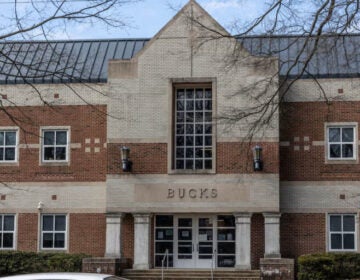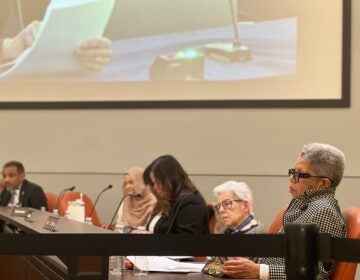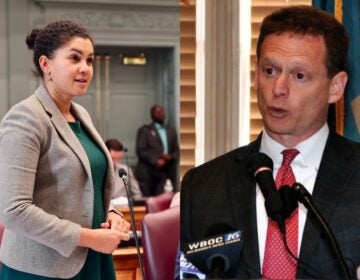Philly district proposes sweeping changes that would affect 5,000 students
ListenThe School District of Philadelphia proposed a sweeping set of changes Thursday that would affect 5,000 students and more than a dozen of its schools — changes that include openings, closings and in-district and charter conversions.
Openings
The district intends to open a new, non-selective Science Leadership Academy middle school in West Philadelphia that would serve as the catchment middle school for Samuel Powel Elementary.
The district also wants to open another new non-selective project based North Philadelphia High School– ran in partnership with nonprofit Big Picture Philadelphia. It opened three similar schools in North Philly last year: The LINC, The U School, and Building 21.
In-district conversion
The district also seeks to create up to three new in-district turnaround schools similar to those which began last year at Blaine and Kelley elementaries in North Philadelphia.
The district has not yet selected these schools, but says at least one high school conversion is likely. The district says it will announce selections in early 2016 with turnaround to take effect during the 2016-17 school year.
Charter conversion
The district also plans to expand its slate of neighborhood schools run by charter operators through the Renaissance initiative.
Jay Cooke (Logan), Samuel B. Huey (West Philly) and John Wister (Germantown) elementary schools are recommended for Renaissance conversion in 2016-17.
The district last sought additional renaissance conversions in 2014, when it gave parents at Edward Steel and Luis Munoz-Marin elementaries the ability to choose who it wanted to run the school: the district or the charter.
Parents at both schools voted for the district to retain control.
This year, the district intends to revert back to the old renaissance model, through which the conversion is predetermined and the parents get to choose between an array of operators.
Closures and mergers
The district also seeks to close two schools. Over the next two years it intends to shutter operations at Dimner Beeber Middle School (West Philly). Morris E. Leeds Middle School (Cedarbrook, Northwest Philly) would close next year.
In place of Beeber, the district says that long-term middle schools plans are in development at each of Beeber’s feeder schools: Overbrook Elementary, Samuel Gompers Elementary and Lewis C. Cassidy Academics Plus School.
Leeds would be merged with Hill-Freedman World Academy. Although Hill-Freedman is currently a selective admission magnet school, it would automatically enroll all of Leeds’ students next year.
An expansion to eighth grade is also recommended for Leeds’ feeder elementary schools, Franklin S. Edmonds and Samuel Pennypacker, which are currently kindergarten through fifth grade schools. Current Pennypacker and Edmonds students would remain at these schools through eighth grade.
11:30am presser
The district has not yet announced a cost for any of its proposals.
To be implemented, each pitch, aside from the in-district turnarounds, would require the blessing of the Philadelphia School Reform Commission.
An 11:30 am press conference is scheduled where the plan will be discussed in detail. A more comprehensive story will be forthcoming.
The district’s official press release is below:
PHILADELPHIA—Today, Superintendent William R. Hite announced a series of recommendations to enhance and improve educational opportunities for more than 5,000 students in The School District of Philadelphia.
In line with the School District’s focus on equity, the changes are designed to provide more students with better school options close to where they live using the System of Great Schools process outlined in Action Plan 3.0.
As described below, the proposals, which impact approximately 15 schools, would expand successful school models, launch new in-District turnaround efforts, create innovative schools in underserved neighborhoods, consolidate schools and reconfigure grade spans. In addition, the District seeks to continue the Renaissance Charter Schools Initiative to transform chronically underperforming schools.
“This is an exciting step forward in achieving our mission of having great schools in every neighborhood,” said Dr. Hite. “These recommendations address parental demand for better academic programs in safe, familiar environments while presenting rigorous and engaging opportunities for students.”
New school recommendations
Two new schools are proposed, a Science Leadership Academy middle school (SLA-MS) and a high school opened in partnership with nonprofit Big Picture Philadelphia.
The non-selective admission SLA-MS would open for the 2016-17 school year in partnership with Drexel University and primarily serve as the catchment middle school for Samuel Powel Elementary School in West Philadelphia. The fifth- through eighth-grade school would use a “grow a grade” model, beginning with 90 fifth-graders next fall.
SLA, an inquiry-driven, project-based, award-winning high school, originated in Philadelphia nearly a decade ago as a partnership with the Franklin Institute. There are now two campuses in Center City and at Beeber Middle School. The curriculum focuses on science, technology, mathematics and entrepreneurship.
The second new school, Big Picture High School, would offer project-based learning and internship opportunities through a nationally recognized model for small innovative schools. The school would be open admission, starting with 125 ninth-graders next fall and growing to 500 students at full enrollment. The District opened three similar schools – Building 21, the U School and the LINC School – in 2014 through the Office of New Schools.
These recommendations will create new options for 860 middle and high school students at full capacity.
In-District School Turnarounds
The District is also seeking to reinvest in and expand its capacity to turn around chronically low-performing schools. Up to three schools will be considered for in-District turnaround, using a school improvement framework that supports students, teachers and families.
The selected schools will be announced in early 2016. Any changes would take effect during the 2016-17 school year.
The turnarounds are expected to impact approximately 1,800 students.
School consolidations and grade reconfigurations
In addition, school consolidations and grade reconfigurations are proposed to improve middle school offerings.
The District recommends that Dimner Beeber Middle School in West Philadelphia be phased out over the next two years. Beeber will not accept an incoming seventh-grade class next year.
Current seventh-graders will be able to remain at Beeber for eighth grade to complete their middle school experience. Beeber would then close at the end of the 2017-18 school year.
Under a proposed grade reconfiguration at Beeber’s three feeder elementary schools, Overbrook Elementary, Samuel Gompers Elementary and Lewis C. Cassidy Academics Plus School would add seventh grade, allowing current sixth-graders to remain at their respective schools for 2016-17. A long-term middle school plan for each school is under development.
Additionally, a merger is proposed for Morris E. Leeds Middle School in northwest Philadelphia and Hill-Freedman World Academy, a two-time National Blue Ribbon School. Current Leeds students would automatically enroll at Hill-Freedman, which offers an International Baccalaureate program and added high school grades last year. Leeds would not accept sixth-grade students for the 2016-17 school year.
An expansion to eighth grade is recommended for Leeds’ feeder elementary schools, Franklin S. Edmonds and Samuel Pennypacker, which are currently kindergarten through fifth grade schools. Current Pennypacker and Edmonds students would remain at these schools through eighth grade.
The elementary feeder schools for Beeber and Leeds have higher climate, academic performance and parent choice rates. If approved, the recommendations would give more than 500 students new middle school options over the next three years.
Although Beeber and Leeds would close, both buildings would continue to house District-operated schools. Current Beeber and Leeds students would have the opportunity to graduate from their school or remain in the same building.
Renaissance Charter Schools Initiative
Jay Cooke, Samuel B. Huey and John Wister elementary schools are recommended for Renaissance Charter School conversion in 2016-17 to address chronic academic and climate challenges. Schools selected for Renaissance conversion continue to serve students in the catchment area through collaborations with high-performing charter operators.
In response to public feedback from past Renaissance efforts, parents and families will have more time to consider their options and work through the transition. Schools under consideration for Renaissance conversion were previously announced in early spring. Under the new timeline, the School Reform Commission will vote in January on new operators for the schools.
“Over the past five years, many students at our Renaissance Charter Schools have made substantial gains in reading and math proficiency,” said Dr. Hite. “Attendance at these schools has improved and serious incidents have dropped. The Renaissance program has rapidly transformed several struggling schools into good schools.”
The School District will issue a Request for Qualifications (RFQ) on Oct. 15 to select potential operators. For the first time, parents will be invited to serve on the formal committee that reviews proposals from potential operators. Dr. Hite will make the final match recommendations to the School Reform Commission. Recommended matches between schools and operators will be announced in December.
All Renaissance Charter Schools have specific targets for improved academic performance, school climate and neighborhood attendance rate. The Renaissance recommendations are expected to impact more than 2,000 current and future students.
Overall, these actions build on the District’s vision of giving all students the access to programs and resources needed for future success, said Dr. Hite.
“Our students have incredibly diverse needs that deserve to be met,” said Dr. Hite. “For more than 5,000 students across these 15 schools, these proposals represent an opportunity for life-changing learning experiences.”
WHYY is your source for fact-based, in-depth journalism and information. As a nonprofit organization, we rely on financial support from readers like you. Please give today.





